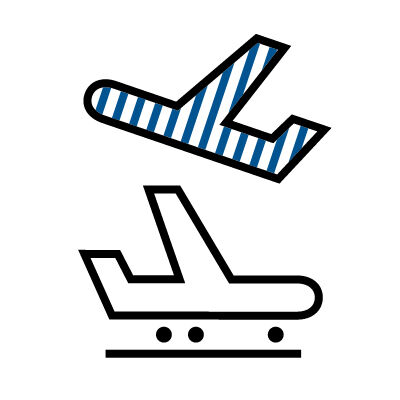Baggage and Animals
Regulations for Flights Operated by Other Airlines
What regulations apply to Condor flights with feeder and connecting flights? Information about flights operated by other airlines can be found here:
Regulations for codeshare flights
If your flight is being operated by an airline other than the airline listed on your flight ticket (a so-called codeshare flight), the free baggage conditions specified on your booking confirmation apply.
Please contact the airline operating your flight directly to book extras (such as seat reservations or the transportation of animals or sports equipment).
Transporting Pets on Connecting Flights
Please note: The transportation of pets on connecting flights operated by our partner airlines is unfortunately not possible.

Regulations for Condor flights that include connecting flights
Please note: feeder and connecting flights are generally operated by the operating airline in conjunction with a Condor flight in Economy Class.
Departure or destination airport not in USA/Canada/Puerto Rico
If you have booked a Condor flight that includes a connecting flight with another airline (providing it is included on the same Condor ticket), the baggage conditions of the airline that operates the most important segment of the journey (normally the geographically-longest segment) apply to the entire journey.
For the registration of extras or special services, such as sports baggage and seat reservations, however, the conditions of the respective airline operating the flight apply. Please contact the airline operating the connecting flight.
What is meant by “most important segment”?
The most important segment is determined by IATA Resolution 302, with which all airlines comply worldwide. This resolution divides the world up into three large tariff areas:
- Tariff Area 1: American continent and Greenland (sub-regions): North America, Central America, Mexico, Caribbean and South America)
- Tariff Area 2: Europe, Africa and Middle East (sub-regions): Europe, Middle East, Africa (including islands in Indian Ocean)
- Tariff Area 3: Asia and Oceania (sub-regions): South Asia, South-east Asia, Japan, Korea, South-west Pacific, Australia, New Zealand).
It is generally the case that the most important segment is that which flies first of all over a tariff area.
There are some exceptions for the most important segment:
- In the case of journeys that entail flying over all three tariff areas, the most important segment is always that between tariff areas 1 and 2.
- In the case of journeys that do not fly over any tariff area, the most important segment is always that which flies first of all over a sub-region.
- In the case of journeys that do not fly over any sub-region, the most important is always that which flies first of all over an international border.
- In the case of journeys that do not fly over any international border, the most important segment is always the first segment.
This rule always applies up to the point at which the journey is interrupted for more than 24 hours (a stopover).
Example of a stopover: You booked a flight from Frankfurt to Rio de Janeiro via Recife.
The flight from Frankfurt to Recife is operated by Condor, while the onward flight will take place with GOL after a stopover (break of more than 24 hours).
In this case, Condor’s baggage policy will apply to the flight to Recife with Condor, while those of GOL apply to the onward flight to Rio de Janeiro.
Departure or destination airport in the USA/Canada/Puerto Rico:
Special baggage regulations apply to flights from/to or via USA/Canada/Puerto Rico on the basis of legislation enacted by the US or Canadian authorities (US Department of Transportation or Canadian Transportation Agency).
Book direct with Condor (website, service center, etc).
If you have booked a Condor flight that involves a connecting flight with another airline, Condor’s policy will apply to the entire journey (including the return flight, providing this is included on the same Condor ticket).
You can find the precise baggage policy on your confirmation of booking.
Bookings made through travel agencies or portals (Expedia, Skyscanner, etc.)
If you have booked a Condor flight that involves a connecting flight with another airline, and Condor is the operator of the first flight, Condor’s policy will apply to the entire journey (including the return flight, providing this is included on the same Condor ticket).
If Condor is not the airline operating your first flight, a special policy may apply to your entire flight itinerary. In this case, the free baggage allowance for the first flight is that for the class of travel booked on the Condor segment (Economy Class, Premium Economy Class, Business Class). If the operator of the connecting flight does not offer the class of travel booked on Condor, your free baggage allowance will be at least the weight allowed in Economy class.
You can find the precise baggage policy on your confirmation of booking.